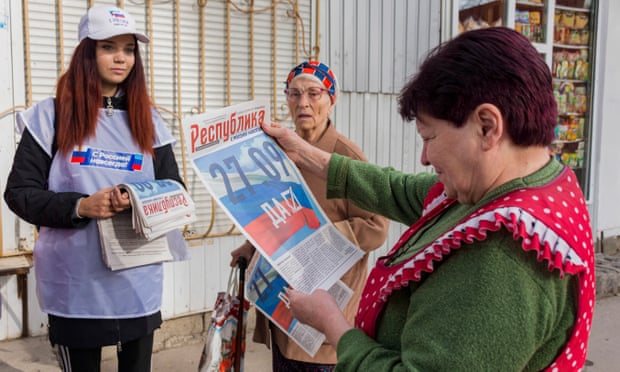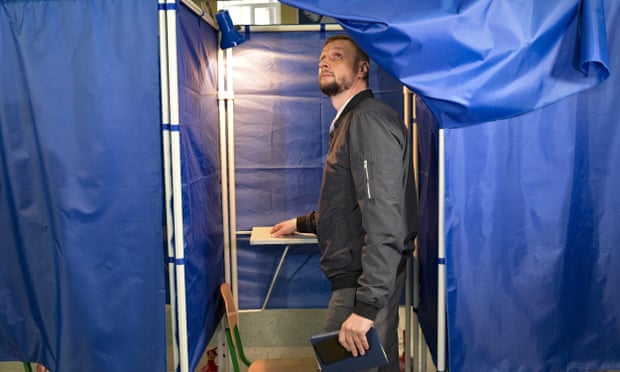Claiming Russian Title to Ukraine's East
"Encroachment on to Russian territory is a crime which allows you to use all the forces of self-defence."“This is why these referendums are so feared in Kyiv and the west."Dmitry Medvedev, former Russian president, deputy chair, security council"There is no referendum. There is a propaganda exercise which is being called a referendum.""It means nothing. It will be a few staged things where there will be Russian television cameras."Mykhailo Podolyak, senior aide, Ukrainian president Volodymyr Zelenskiy"From the very start of the operation … we said that the peoples of the respective territories should decide their fate, and the whole current situation confirms that they want to be masters of their fate,"Russian foreign minister, Sergei Lavrov
 |
| A volunteer distributes the Republic campaign newspaper with the slogan '27.09 – Yes' during a campaign rally for a referendum to join the Russian Federation in downtown Luhansk, Ukraine. Photograph: EPA |
The
sudden launch of a 'referendum' whose purpose is to demonstrate to the
world that Ukrainian citizens living in occupied Luhansk and Donetsk
regions of the Donbas would produce an overwhelming vote in favour of
joining Russia, is meant to give legitimacy to Vladimir Putin's illegal
occupation and invasion of Ukraine. All the more desperately sought as
validation of Russia's claims of historical regional ownership in
consideration of recent setbacks where the Ukrainian military has
launched its counteroffensive with gratifyingly obvious success for
Ukraine's reclamation of its territories and towns.
Moscow,
however is leaving nothing to chance. It is clear that the population
of the Donbas is being coerced to 'vote' in Russia's favour, leaving an
oppressed population little choice but to support Russia's claim that
the population agrees it is in favour of leaving Ukraine and joining
Russia. Ukrainian officials speak of people being banned from leaving
some of the occupied areas while the four-day vote is being conducted.
And
as additional measures to make certain that people do as they're told
under duress, armed groups go directly to homes forcing people to cast
their ballots. Elsewhere, employees face threats of losing their
employment should they fail to participate. "Today, the best thing for the people of Kherson would be not to open their doors", advised displaced first deputy council chairman of Kherson region, Yuriy Sobolevsky..
With
Ukraine's recapture of large swaths of the northeast in their
counteroffensive, the voting manoeuvre was organized in great haste. The
same Ukraine counteroffensive highlighting a weak Russian military
response, impelled Vladimir Putin to act on a matter he has been
famously loathe to call upon, knowing the furious public reaction that
would result, by calling up a partial military draft to swell the
military by 300,000 troops to deploy to Ukraine.
Moscow
envisions succeeding in new attacks to retake the initiative in the
grinding conflict. By formally incorporating vulnerable, occupied areas
of Ukraine, as essentially Russian, Vladimir Putin would then regard
attacks on those areas by Ukraine as representing attacks on Russia
itself, to justify a response possibly as frighteningly severe as a
nuclear attack. Nothing would merit such a starkly globally extreme
attack in the Russian attack against Ukraine, but the reverse obviously
would.
References
to Russia's nuclear arsenal have gone well beyond idle talk; they are
now being invoked as a possible option should Russia find itself in
extremis. There is little that could be viewed as more terrorizing than
unleashing a nuclear bomb in the context of a war Russia has imposed on a
neighbour, with its far-reaching menace and ramifications throughout
Europe. Much less a necessary response that would draw the entire region
and beyond into a wider conflict.
In
the east and northeast, voting in the provinces of Luhansk, Donetsk,
Kherson and Zaporizhzhia represent a desperate attempt by the Kremlin to
legitimize the illegality of the occupation of a third of Ukraine, in
what is essentially the country's industrial heartland. Serhiy Gaidai,
Luhansk's Ukrainian governor, spoke of the population of the town of
Starobilsk banned from leaving, with people forced from their homes to
vote. The situation, he said, was "elections without elections", where people were forced to complete "pieces of paper" lacking privacy, in kitchens and yards.
"The
mood of the Russians is panicky because they were not ready to carry
out so quickly this so-called referendum, there is no support, there's
not enough people", explained Sobolevsky from Kherson.
The votes have been condemned by leaders of the West and the United
Nations, viewing the issue as an illegitimate precursor to illegal
annexation, simply put, with no independent observers where a large
percentage of the pre-war population having fled.
"It's all nonsense, bluff and political manipulation to frighten us and the Western countries with their nuclear stuff",
remarked 64-year-old Oleksandr Yaroshenko, resident of Kyiv.
Previously, a referendum was staged as a pretext for annexation of
Ukraine's Crimea in 2014. Russia's little set-piece strategies for
returning its neighbours to their pre-Soviet-disintegration servitude.
 |
| Vladimir Vysotsky, the head of the Central Election Commission of the so-called Donetsk People’s Republic, inspects a polling station before a referendum in Donetsk, eastern Ukraine. Photograph: AP |
Labels: Donbas, Referendum, Russian Invasion of Ukraine, Ukraine, Ukrainian Counteroffensive

<< Home